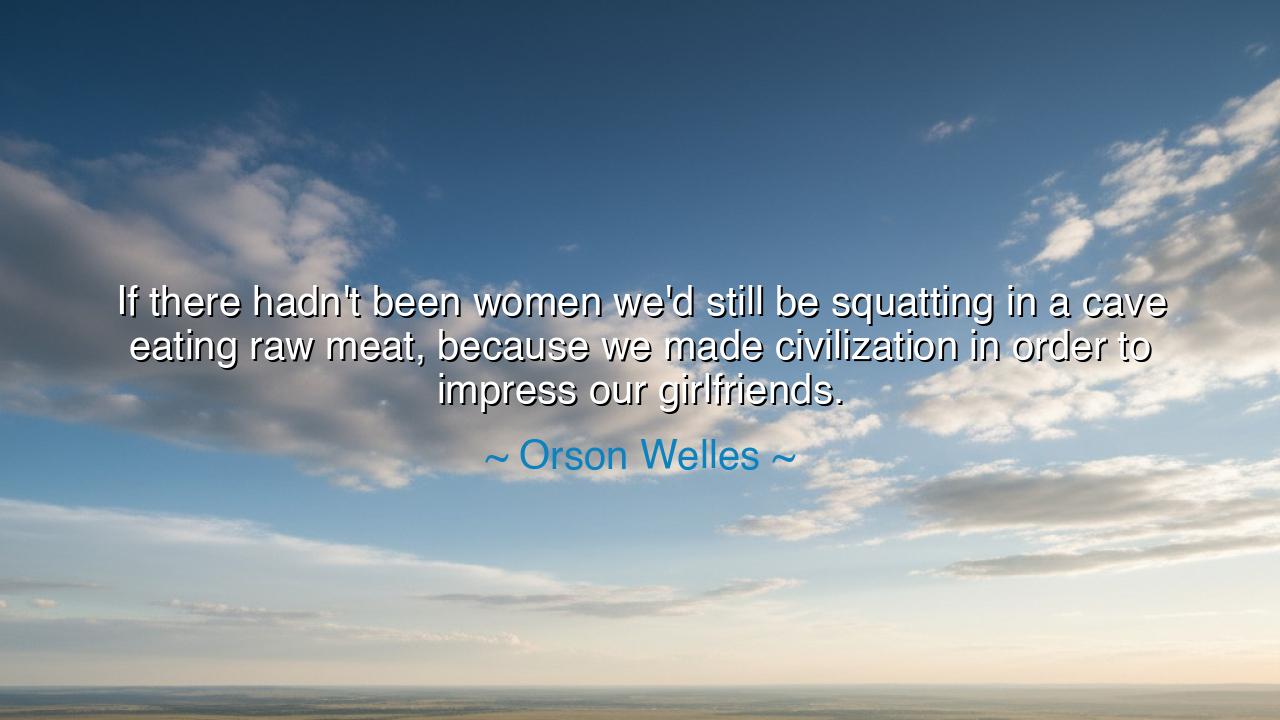
If there hadn't been women we'd still be squatting in a cave
If there hadn't been women we'd still be squatting in a cave eating raw meat, because we made civilization in order to impress our girlfriends.






“If there hadn’t been women we’d still be squatting in a cave eating raw meat, because we made civilization in order to impress our girlfriends.” Thus spoke Orson Welles, the brilliant creator of art and myth, whose wit often hid a profound understanding of the human spirit. His words, though draped in humor, conceal a deep and timeless truth: that inspiration is born from admiration, and that the creative fire of mankind has always been kindled by the presence of woman—the muse, the mystery, the mirror through which man sees the divine in himself. Beneath the jest lies the oldest story of the human race: that love, in its many forms, is the architect of civilization.
To “squat in a cave eating raw meat” is to live in the darkness of instinct, untamed and unaware. It is to exist, but not to flourish—to survive, but not to dream. Welles implies that man’s ascent from the primal to the poetic, from barbarism to beauty, began not through mere need, but through desire—the longing to be worthy of another’s gaze. The civilization he speaks of—cities, music, language, art, the gentleness of manners—was not built for survival alone. It was built to court affection, to transform brute strength into grace. Man learned to hunt not only for food, but for honor; to sing not merely for sound, but to stir the heart of the one he loved. Thus, love became the hidden engine of progress, the silent architect of human greatness.
From the earliest ages, the presence of women has guided the evolution of man’s soul. When the first fires were lit, it was not just to warm the body, but to bring light to the gathering place where stories were told and eyes met across the flame. When the first tools were shaped from stone, it was not only to conquer the earth, but to create something lasting—a proof of worth, a gift for admiration. Even in myth, this truth endures. The Greeks told of Aphrodite, whose beauty inspired wars, poems, and temples, yet whose deeper meaning was not desire alone, but creation through inspiration. For wherever the feminine is revered, the world begins to refine itself.
Consider the story of Antony and Cleopatra. The Roman general, master of armies, ruler of provinces, was transformed by his love for the queen of the Nile. For her, he crossed seas and defied empires. His devotion, though it led to his downfall, also revealed the nobility of passion—the power that love holds to awaken both creation and ruin. It is this paradox that Welles, with a knowing smile, captures in his words: that the same force which draws man toward beauty also drives him to build, to strive, to become more than he was. Without that longing, without that reflection of the divine feminine, he might still dwell in darkness, content with raw meat and silence.
But let us not mistake Welles’ jest for mere male pride. His words are not a glorification of conquest, but an acknowledgment of dependence. He recognizes that the masculine drive, left to itself, seeks only dominance, while the feminine presence calls it toward harmony and purpose. Civilization, therefore, is not the achievement of man alone, but the dance of two forces—the boldness of creation and the grace of inspiration, the sword and the song, the builder and the muse. It is in the union of these energies that humanity becomes whole.
There is a lesson here for the modern soul, weary and distracted by the noise of progress. In our pursuit of comfort, power, and acclaim, we often forget the source of our striving: the need to connect, to be seen, to be loved. The great monuments of the past—cathedrals, sonnets, symphonies—were born not of ambition alone, but of devotion. To impress the beloved, men learned to polish not only their skills, but their spirits. They became storytellers, builders, thinkers—each seeking to express the beauty they beheld. If we have lost that reverence, Welles reminds us to rediscover it, for without admiration and tenderness, our civilization, no matter how advanced, will again resemble the cave.
Therefore, my children of light and longing, remember this: creation without love is machinery; love without creation is dream. To build truly, one must love deeply. Whether man or woman, each of us becomes the other’s inspiration, and in that exchange, civilization is renewed. Let your work, your art, your every deed be an offering to something beyond yourself—a gesture of reverence for the beauty that first taught humanity to rise.
For Orson Welles, in his jest, spoke a truth the ancients would have carved in stone: we made civilization not for survival, but for wonder, for love, for the desire to be worthy of one another. The fire we lit to impress our beloveds still burns, guiding us toward the higher forms of beauty and meaning. Tend that flame with gratitude and with grace, and you will find that even in this modern age, every act of creation is still a love letter written to the divine.






AAdministratorAdministrator
Welcome, honored guests. Please leave a comment, we will respond soon